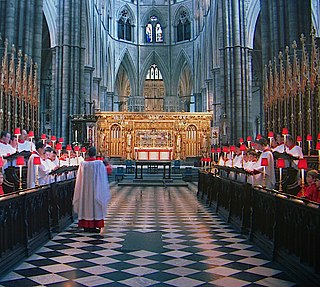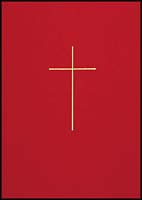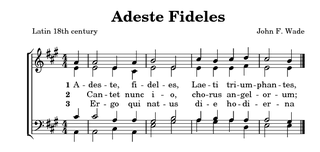Amanda Husberg (born 1940 in Chicago, Illinois - February 15, 2021) was an American composer of hymns.
Amanda Husberg (born 1940 in Chicago, Illinois - February 15, 2021) was an American composer of hymns.
She received her B.S. in Education in 1962, from Concordia Teachers College in Seward, Nebraska, where she majored in Organ, studying with Jan Bender. She taught elementary school for two years at Redeemer Lutheran School in Westfield, New Jersey, before going to Brooklyn, New York, to do parish work. She received her M.S. in Early Childhood Education from Hunter College in New York City. [1]
Before her retirement, Husberg worked for thirty-six years as a Director in one of the 450 publicly funded day care centers in New York City.
For 55 years she has been the Director of Music at St. John the Evangelist Lutheran Church, now a multicultural congregation in the Williamsburg section of Brooklyn. [2] On June 10, 2000, she was presented with the Servant of Christ award from the Atlantic District of the Lutheran Church–Missouri Synod for her contribution to the greater church in the field of music, specifically in the area of hymns and congregational song.
Husberg has had 286 hymn tunes published in the United States, Canada, Brazil, the United Kingdom, and China. Her hymns are in hymnals and supplements published by a variety of publishers and denominations, including the popular Methodist supplement, The Faith We Sing, which also includes her most popular tune, Jennings-Houston, now published in six different hymnals and supplements, [3] including Lutheran Worship . She has written two liturgical masses, one of which, The Brooklyn Mass, is currently being used at her church. She also has had several choral pieces published.
Her own book of 47 tunes to new texts (including 8 of her own), When You Pass Through the Waters, was published by Wayne Leupold Editions, Inc., in 2005. [4] A new collection of 70 tunes was published in 2012, with texts by Lutheran poet and hymn text writer Gracia Grindal. The texts and tunes cover the New Testament readings for Lectionary year B. She has also composed 15 psalm songs for 2-part choir with refrains for the congregation, texts by Richard Leach. Both parts have instrumental descants. This Psalter was published by Concordia Publishing House in 2012. Concordia Publishing House published a second Psalter book in the series in 2013, and the third book in 2014.
When Husberg first came to St. John's Church, it was entirely African-American. Through the years she has played spirituals, jazz, gospel, and a variety of other styles of music, from Johann Sebastian Bach to Andraé Crouch. All this is reflected in the variety of styles she writes in for her hymns, with a special love of early American pentatonic music and gospel music.
She is a member of the Hymn Society in the United States and Canada and credits them with nurturing her hymn writing efforts. [5] She writes for congregational singing, believing that we do sing with one voice, young and old, people of all walks of life, new singers and experienced singers. Together we sing praise to the One who accepts all our praise, no matter how beautiful it is, or how humble it may be. She is also a member of the American Composers Forum, the Association of Lutheran Church Musicians, and ASCAP, from which she has received yearly awards since 2001.
Husberg completed a resurrection requiem mass "A Feast Prepared", written at the request of Terrance Lindall, a renowned artist of Lutheran upbringing whose illustrations for John Milton's Paradise Lost are the most famous of the 20th century for the subject. The text of the requiem mass is new, written by Lutheran sacred poet and hymn writer Richard Leach. The requiem was premiered in Elizabethtown, Kentucky, the weekend of March 5 and 6, 2011.
Terrance Lindall painted Husberg into his Paradise Lost Altarpiece to honor her and Richard Leach for their efforts on the requiem. A signed and dedicated copy of the requiem is in the collection of the Yuko Nii Foundation and the Robert J. Wickenheiser Milton collection along with full sized Giclee prints of the altarpiece signed by Lindall. [6]

"A Mighty Fortress Is Our God" is one of the best known hymns by the Protestant Reformer Martin Luther, a prolific hymnwriter. Luther wrote the words and composed the hymn tune between 1527 and 1529. It has been translated into English at least seventy times and also into many other languages. The words are mostly original, although the first line paraphrases that of Psalm 46.

Anglican chant, also known as English chant, is a way to sing unmetrical texts, including psalms and canticles from the Bible, by matching the natural speech-rhythm of the words to the notes of a simple harmonized melody. This distinctive type of chant is a significant element of Anglican church music.

The Lutheran Hymnal (TLH) is one of the official hymnals of the Lutheran Church–Missouri Synod (LCMS). Published in 1941 by Concordia Publishing House in St. Louis, Missouri, it was the denomination's second official English-language hymnal, succeeding the 1912 Evangelical Lutheran Hymn-Book. The 1969 Worship Supplement contains additional hymns and service music.

Lutheran Service Book (LSB) is the newest official hymnal of the Lutheran Church–Missouri Synod (LCMS) and the Lutheran Church–Canada (LCC). It was prepared by the LCMS Commission on Worship and published by Concordia Publishing House, the official publisher of the LCMS. It is the fourth official English-language hymnal of the LCMS published since the synod began transitioning from German to English in the early 1900s. LSB is intended to succeed both The Lutheran Hymnal (TLH) and Lutheran Worship (LW) as the common hymnal of the LCMS. Supplemental and companion editions to the hymnal were released throughout the end of 2006 and into 2007. The hymnal was officially approved by the LCMS at the 2004 LCMS National Convention in St. Louis. It was officially released on September 1, 2006, but many customers who pre-ordered the hymnal received their copies several weeks earlier.

Evangelical Lutheran Worship (ELW) is the current primary liturgical and worship guidebook and hymnal for use in the Evangelical Lutheran Church in America (ELCA) and the Evangelical Lutheran Church in Canada (ELCIC). It was first published in October 2006 by the ELCA's publishing house, Augsburg Fortress. The new worship resource replaced its predecessor of 28 years before, the Lutheran Book of Worship (LBW) of 1978, and that hymnal's supplements: Hymnal Supplement 1991, published by GIA Publications, a Roman Catholic publishing house, and With One Voice (WOV), published by Augsburg Fortress in 1995.

Psalm 67 is the 67th psalm of the Book of Psalms, beginning in English in the King James Version: "God be merciful unto us, and bless us; and cause his face to shine upon us". In Latin, it is known as "Deus misereatur". In the slightly different numbering system of the Greek Septuagint version of the Bible, and in the Latin Vulgate, this psalm is Psalm 66. Its theme is a prayer for God's mercy, blessing and light.

A hymn tune is the melody of a musical composition to which a hymn text is sung. Musically speaking, a hymn is generally understood to have four-part harmony, a fast harmonic rhythm, with or without refrain or chorus.
John A. Dalles is a clergyman and hymnwriter who was born in Pittsburgh, Pennsylvania, United States. A graduate of Penn State, Lancaster Theological Seminary and Pittsburgh Theological Seminary, he is an ordained minister in the Presbyterian Church (U.S.A.). Having served the First Presbyterian Church of South Bend, Indiana and the Fox Chapel Presbyterian Church, from 1997 until 2019 he served as Senior Pastor of Wekiva Presbyterian Church in Longwood, Florida. Following his 22-year senior pastorate at Wekiva, he was the Interim Senior Minister and Head of Staff of the Shadyside Presbyterian Church, in Pittsburgh, 2019–2021.
Jessie Seymour Irvine was the daughter of a Church of Scotland parish minister who served at Dunottar, Peterhead, and Crimond in Aberdeenshire, Scotland. She is referred to by Ian Campbell Bradley in his 1997 book Abide with Me: The World of Victorian Hymns as standing "in a strong Scottish tradition of talented amateurs who tended to produce metrical psalm tunes rather than the dedicated hymn tunes increasingly composed in England."
Carl Flentge Schalk was a noted Lutheran composer, author, and lecturer. Between 1965 and 2004 he taught church music at Concordia University Chicago. During this time he guided the development of the university's Master of Church Music degree, which has since graduated more than 140 students. Schalk was a member of the Inter-Lutheran Commission on Worship, which produced the Lutheran Book of Worship in 1978. He was also the editor of the journal Church Music from 1966 to 1980. Additionally, he was a published composer for Choristers Guild, a member of the Music Advisory Committee of Concordia Publishing House and of the board of directors of Lutheran Music Program, the parent organization of the Lutheran Summer Music Academy and Festival.

"The Lord's My Shepherd" is a Christian hymn. It is a metrical psalm commonly attributed to the English Puritan Francis Rous and based on the text of Psalm 23 in the Bible. The hymn first appeared in the Scots Metrical Psalter in 1650 traced to a parish in Aberdeenshire.
Richard Leach is an American hymn writer and poet.

Psalm 72 is the 72nd psalm of the Book of Psalms, beginning in English in the King James Version: "Give the king thy judgments, O God, and thy righteousness unto the king's son". In the slightly different numbering system used in the Greek Septuagint and Latin Vulgate translations of the Bible, this psalm is Psalm 71. In Latin, it is known as "Deus iudicium tuum regi da". Traditionally seen as being written by King Solomon, its heading may be translated 'to or for Solomon'.
The Evangelical Lutheran Hymn-Book was the first official English-language hymnal of the Lutheran Church–Missouri Synod, then known as the Evangelical Lutheran Synod of Missouri, Ohio, and other States. It was published in 1912 by the synod's publishing house, Concordia Publishing House, in St. Louis, Missouri.

Lutheran Worship (LW) is one of the official hymnals of The Lutheran Church–Missouri Synod (LCMS). Published in 1982 by Concordia Publishing House in St. Louis, Missouri, it is the denomination's third English-language hymnal and was intended to replace The Lutheran Hymnal (TLH). Additional hymns and service music are contained in the companion, Hymnal Supplement 98.

The Erfurt Enchiridion is the second Lutheran hymnal. It appeared in 1524 in Erfurt in two competing editions. One of them contains 26 songs, the other 25, 18 of them by Martin Luther, others by Elisabeth Cruciger, Erhard Hegenwald, Justus Jonas and Paul Speratus. While the songs of the Enchiridion could be used in churches, they were intended primarily for singing elsewhere, such as at home, at court, and in guild meetings.

Chorale is the name of several related musical forms originating in the music genre of the Lutheran chorale:

Christian Worship: Hymnal is the most recent hymnal authorized by the Wisconsin Evangelical Lutheran Synod (WELS). It was published in 2021 by Northwestern Publishing House (NPH), the official publisher of the WELS, and intended to replace Christian Worship: A Lutheran Hymnal. The WELS Hymnal Project Executive Committee began preparations for the hymnal in 2013; the project chairman was Jon Zabell and the project director was Michael Schultz.

Nancy Elizabeth Miller Raabe is an American clergy member, author, and composer. She is the pastor of Grace Lutheran Church in Hatfield, Pennsylvania.